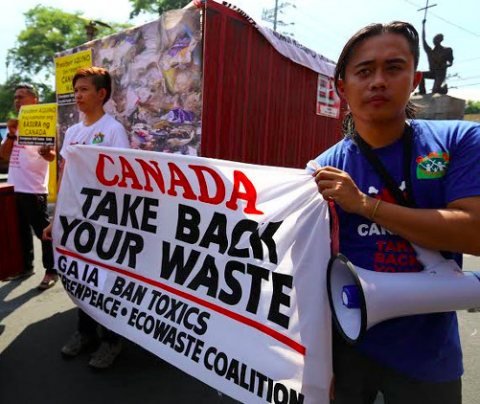Legal Opinion Finds Canada In Violation of Basel Convention

A recent legal opinion from the Pacific Centre for Environmental Law and Litigation Law Corporation has determined Canada’s refusal to repatriate 103 shipping containers of garbage illegally dumped in the Philippines in 2013 and 2014 to be in violation of the Basel Convention.
Read the letter and legal opinion that has been sent by IPEN and partner NGOs Right On Canada, Canadian Environmental Law Association, EcoWaste Coalition, and Basel Action Network to Canada’s Prime Minister Trudeau about this issue, which is not just a legal matter, but also a moral issue that demonstrates Canada’s level of respect for the citizens of developing countries and how the nation demonstrates proper conduct. Leaving Canada’s garbage in another country for five years reveals values that clash with moral responsibility.
Important points from the legal opinion include:
- The shipments of the wastes were “illegal traffic” under Article 9 of the Basel Convention, because the wastes were falsely declared to contain homogeneous plastic scrap material. In fact, these shipments contained mixed waste, including household garbage, and were deemed to be hazardous under Philippine law.
- Article 9 of the Convention imposes an obligation on the State of export to ensure the return of wastes within 30 days from the time the State of export was notified of the illegal traffic.
- Philippine authorities notified Canada of the illegal traffic of these wastes as early as March 2014 and have sought Canada’s assistance in returning the wastes. To date, Canada has refused to take back any of the wastes. This refusal violates Article 9, paragraph 2 of the Basel Convention.
- In 2016, a court in the Philippines ordered that 50 containers of the wastes be returned to Canada, as required by Philippine law. The judge stated: “Our country should not be made a trash bin by other country. This should not be made a precedent for other countries to follow. If our country allows [sic] the disposal of the wastes from other countries to be locally disposed, we will become the place of disposing other countries’ wastes and garbage.” While Canada was not legally obliged to obey the court order, it certainly had a moral responsibility to do so. The Canadian government chose, however, to ignore the court order.
- For more than 5 years, Canada has failed to take responsibility to properly manage the wastes in question, which were generated in Canada, and has left the Philippine government with the burden and costs of dealing with the wastes, contrary to Article 4, paragraph 10 of the Convention.
- Canada’s current statutory regime governing the transboundary movement of hazardous wastes fails to properly implement and enforce Article 4, paragraph 4 of the Basel Convention, which imposes a 30-day time limit for the State of export to ensure the return of wastes back to the State of export in the case of illegal traffic. Canada's amended regulations permit a 90-day time limit.
